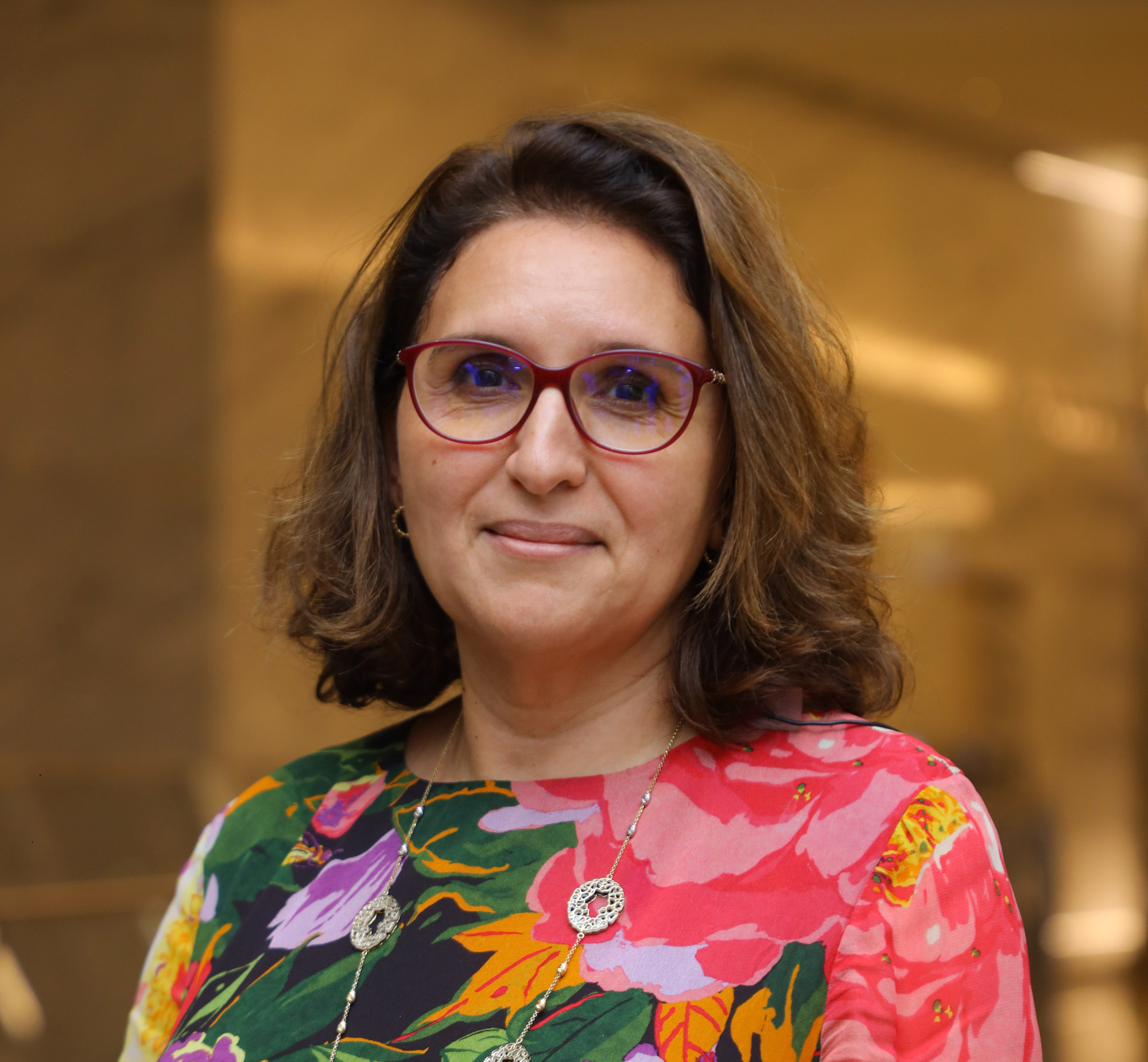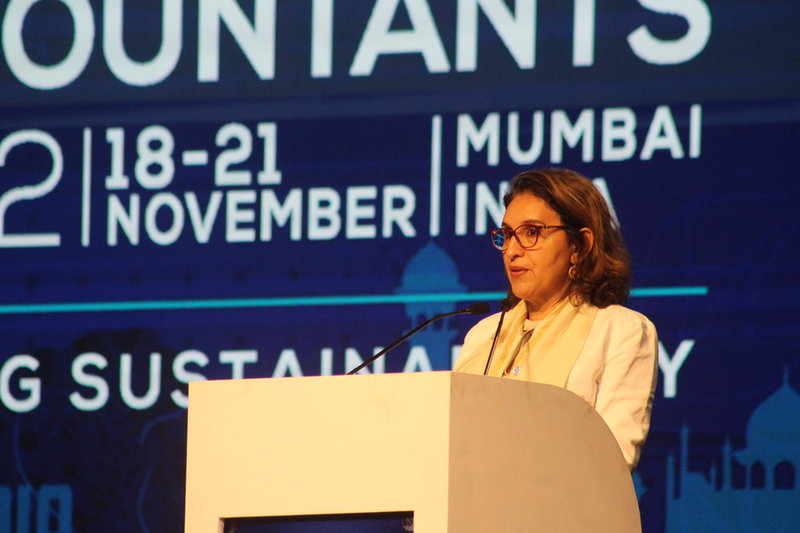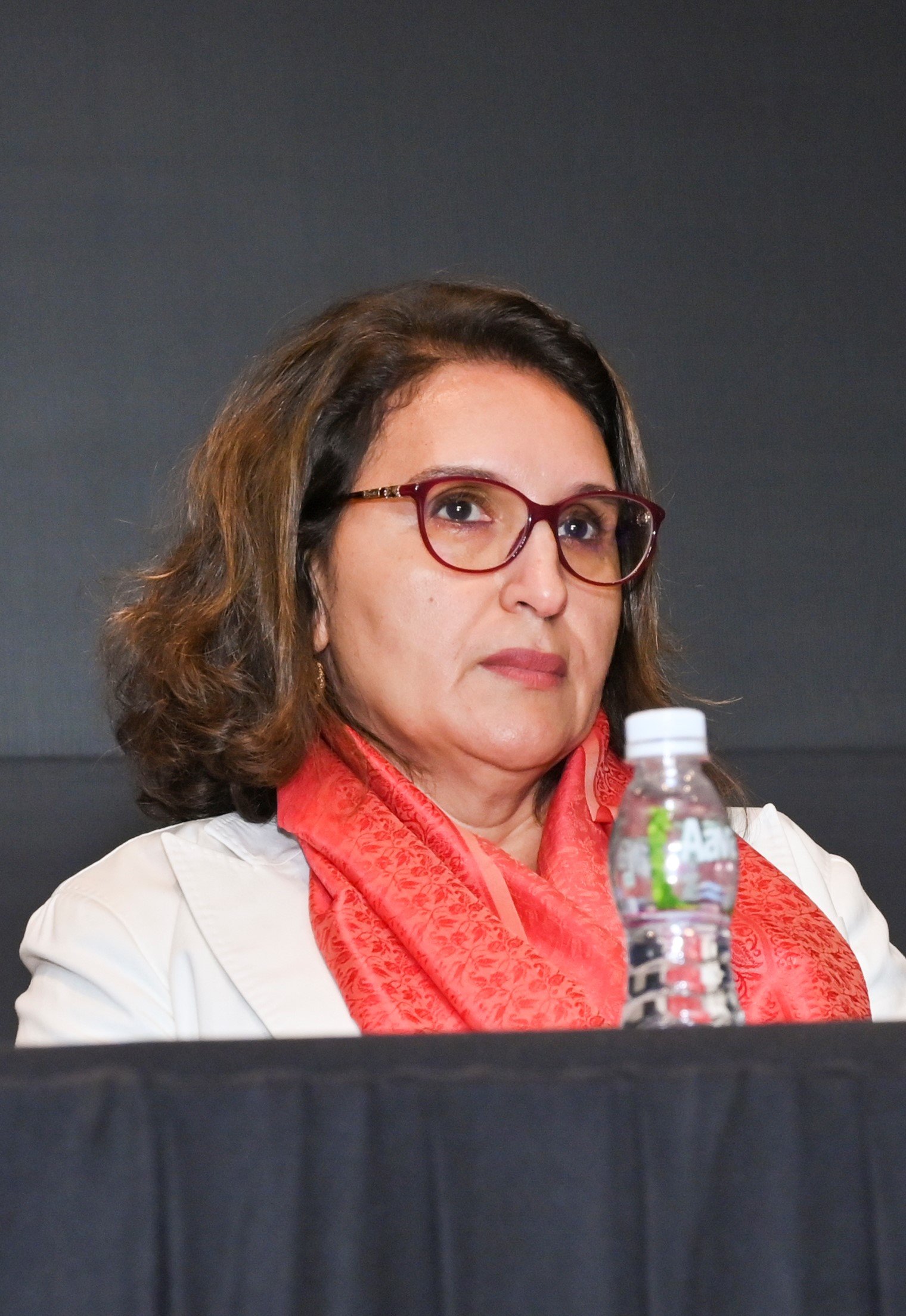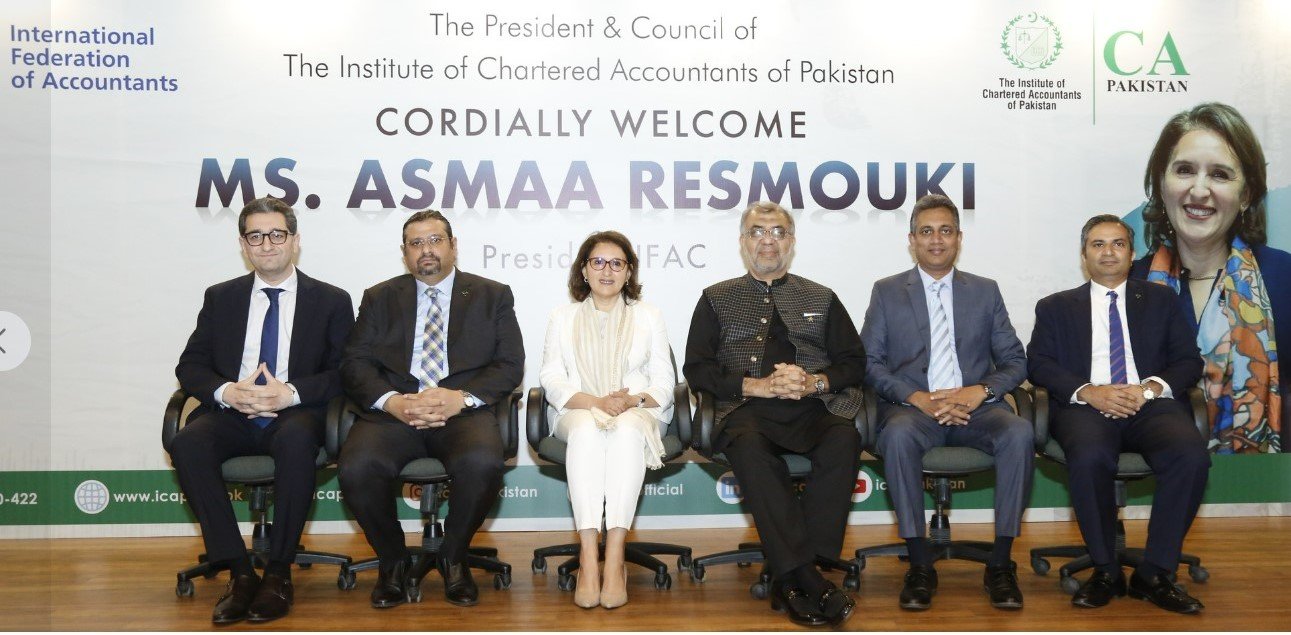C-Suite Q&A
The Power of Authenticity
Asmâa Resmouki took up office as IFAC President in November 2022. Zoya Malik, Editor-in Chief, International Accounting Bulletin spoke to her about her career journey, bringing authenticity to leadership and about IFAC’s L&D initiatives and public interest mandate.

CPAs have long been a valued presence on corporate boards and audit committees in Canada. But as a landmark study by CPA Canada and KPMG suggests, many CPAs wait until they are approaching retirement or later to become directors. This is a missed opportunity, according to Ismail Akhter, CPA, director, tax & audit, Member Development and Support at CPA Canada and study lead co-authors Wendy Kei, FCPA, and Deborah Rosati, FCPA.
“Given the value they can bring to the table, and the career benefits that board membership can bring, CPAs should consider becoming board members much earlier in their careers,” says Akhter.
Zoya Malik: Kindly outline your career journey and explain how you moved up the career ladder to your current role at IFAC?
Asmâa Resmouki: When I finished my studies, I was sure I wanted to join a consultancy firm. That seemed like the best way to live a fulfilling, exciting, and international career. But there were no such firms in Morocco at the time, so I went into audit. I worked my way up to partner at EY, then moved on to Deloitte in 2008, where I was a partner until 2020.
I also devoted time to the development of the African accountancy profession from 2011 to 2017 as a Board member, and later as vice president and president, of the Pan-African Federation of Accountants (PAFA). At the end of my tenure at PAFA, I joined the IFAC Board with the nomination of my professional body, Ordre des Experts-Comptables du Maroc. The IFAC Board elected me deputy president in November 2020 and president in November 2022.
In the end, I found the career I wanted not as a consultant, but as a professional accountant.

IFAC President Asmâa Resmouki at the beginning of her term in office, November 2022
Zoya Malik: Who have been your mentors on your career journey? What were their strengths?
Asmâa Resmouki: I did not have any long-term mentors, but at many steps along my path I was fortunate to have people in my life who saw things in me that I did not yet see in myself. These people encouraged me to put myself forward, to aim higher, to achieve more. Eventually I learned to have that faith in myself by their example.
I am excited about an ongoing IFAC initiative called “Women Take the Lead: Get to Know Accounting’s Changemakers.” This is a series of interviews featuring inspirational women with diverse roles and backgrounds who have succeeded in part due to their accountancy education. I highly recommend tuning in to hear the stories of these remarkable role models.
Zoya Malik: What do you think are some of the greatest challenges women seeking to progress to executive roles face today?
Asmâa Resmouki: I hesitate to speak for others, but in my experience, women have a strong inner critic that can prevent us from taking the next step. This seems especially true for women in a leadership role, or those considering taking a leadership role. I think this is a product of social conditioning: men are taught to be assertive, and women often are not. There are many other challenges facing women seeking leadership roles, and many of those challenges are completely external, but I do think this bit of psychology plays an important part.

Address to the 2022 World Congress of Accountants in Mumbai, India
Zoya Malik: What are the unique strengths you bring from your cultural and academic background and drive to lend a diverse standpoint alongside IFAC colleagues?
Asmâa Resmouki: This is more specific to a personality than to a culture, but I believe there is tremendous power in claiming your authenticity. Each of us knows what makes us unique, although we sometimes struggle to show our authentic selves to others. I would encourage everyone, and especially women, to put yourself forward and to be proud of your true self.
I am very proud to have been the first female partner in a Big Four firm in Morocco – but there were many more soon after me. I hope that my example encouraged other women to be themselves. I am sure that their example inspired many more women after them. This is the power of authenticity.
I will add that I am also very proud of my work as audit partner training younger cohorts. I occasionally hear from those younger professionals about the positive difference I made in their lives as a role model and a mentor – and this really brings me joy.
Zoya Malik: What is IFAC’s public interest mandate that you are focussing on?
Asmâa Resmouki: I find it helpful to think of our public interest mandate this way: What would the world be like without accountants?
For example, try to imagine financial markets and global economies without the contribution of our profession in preparing and assuring financial reporting. It would be impossible. Without our skills and competencies in planning, risk management, and a wide range of other internal functions, decision makers would lack critical information. You can see that our profession’s role in the public interest is enormous.
At its foundation, ours is a people profession. Our future readiness – and with it, our ability to meet our public interest mandate – depends on attracting, retaining, and investing in current and future accounting professionals. This is a tough issue to tackle at the global level. The truth is that we have different challenges in attraction and retention in different jurisdictions; there is no single, global solution. I think this highlights the need for more collaboration across the global profession – and IFAC is an important convener and link – to better understand the variety of challenges and develop the right solutions.
Developing the right education and training programmes, especially on sustainability, is an imperative for the entire profession. Accountants have the foundational skills and competencies to lead on sustainability. What we need now is an individual and collective commitment to continuous learning, up-skilling, and adaptation. At stake is the wellbeing of people and planet. We have to do our part to keep up the momentum around the green transition.
Professional ethics are always an area of special focus. The principles in the IESBA’s International Code of Ethics are the basis of our trusted relationships with our stakeholders – trust that takes many years to build but can be lost in an instant. We should pay close attention to how new technologies, such as artificial intelligence, are creating new ethical considerations for accountants.

Asmâa Resmouki at the November 2022 meeting of the IFAC Council
Zoya Malik: What skills do you think a new generation of recruits will need to drive the profession forward over the next five years?
Asmâa Resmouki: A major factor will be new skills and competencies around new information and communications technologies. The next generation of accountants will need to be familiar with the impact of these technologies on business models, strategies, and data analysis, among many other areas. Accountants will find themselves using digital tools more frequently in their work, and inevitably will need to consider the use of new technologies as they emerge. Over the next five years – and beyond – we also need to drive very deliberately toward skills and competencies in sustainability. There really is no time to waste.
However, I think it would be a mistake to focus only on these emerging areas. We already have a diverse wealth of skills and expertise that will remain extremely valuable in the long term. Organisations will continue to value the critical thinking, problem solving, professionalism, and integrity of professional accountants. These foundational skills make us inherently adaptable. Consider, for example, an accountant tasked with determining which non-financial information is meaningful and relevant to an organisation’s management or its shareholders. This is a job we have performed for centuries with financial information. Meeting this new task will not require a reinvention of our skill set, but an expansion of our subject matter knowledge to include certain aspects of sustainability.
In any case, every accountant will benefit greatly by committing to collaboration and life-long learning. We are likely to find ourselves working with specialists in unfamiliar areas. Learning will be much easier if we think of these new relationships as opportunities.
Zoya Malik: What more can be done to support L&D in terms of training for CPA certification and CPD delivery to ensure accountants have the required skills to advise clients?
Asmâa Resmouki: We need to become more agile and responsive to change in designing the pre-qualification curriculum. As we experience differing demands from the market and differing expectations from students, learning needs to be dynamic and effectively prepare students for an ever-changing world. We need to shift from “textbook thinking,” in which content is static and not easily updated, to “digital thinking,” in which content can change as needed. Some call this an “evergreen” approach to the curriculum, with requirements that change continuously to match real-world needs.
IFAC aims to support our member organisations in providing high-quality CPD to their members. We gather free resources from around our network on our sustainability CPD page, and we have archived video series from our annual EdExchange Summits on a wide range of topics.
We are also noticing a trend among CPD providers toward meeting the learner where they learn best. Sometimes that means timing a CPD module to be viewed with the first cup of coffee before the kids are up, or maybe in a quiet moment right after lunch. Some people learn best in the classroom, but some learn best when they can pause and rewind the material and revisit it as a practical guide to relevant tasks at work. To reach all different learning styles, and to continue to build on inclusivity and equity measures in our profession, it is important for CPD providers to teach in the learner’s preferred mode of instruction.
Zoya Malik: change to ‘What impact do you think the move to hybrid working will have on women seeking executive positions, and what can firms do to assist female executives who have caring responsibilities?
Asmâa Resmouki: I find that the greatest benefit of hybrid or remote work is the greater flexibility and the considerable time saved. The flexibility is especially important for women, who bear a disproportionate share of caring and family responsibilities. More flexible work arrangements help to level the playing field by allowing women to handle those responsibilities on their own schedule. (It can also save them a lot of time they would have spent commuting.) So, I hope that flexible work arrangements are here to stay.

Asmâa Resmouki with the leadership of the Institute of Chartered Accountants of Pakistan in Bhurban, Pakistan, March 2023
Zoya Malik: How do you think the make-up of Executive Boards are changing with women taking leadership positions and what qualities are requisite on a Board in achieving a balanced outlook for all stakeholders?
Asmâa Resmouki: We should recognise our biases. This is the only way we can come to understand their origins and mitigate their consequences. And in an important sense, we cannot truly know ourselves until we recognise our biases.
The rise of women to executive boards is a long overdue and very positive development not only for women, but for entire organisations. Women have all at some point been keenly aware of bias against us on our career paths. When women succeed despite this bias, we arrive in leadership roles with a clear understanding of the problem; we recognise, and so we can change things for the better. The outcome is a more balanced outlook and more diverse, equitable, and inclusive environments.
Asmâa Resmouki became IFAC President in November 2022. Prior to becoming President, Ms. Resmouki was appointed Deputy President in November 2020 after serving on the IFAC board since November 2017, originally nominated to the board by the Ordre Des Experts Comptables—Morocco. As Deputy President, Ms. Resmouki chaired the IFAC Planning and Finance Committee having previously chaired the board's Governance Subcommittee prior to her election as Deputy President.
Resmouki is a Past President of the Pan African Federation of Accountants (PAFA). She served on the PAFA Board since 2011, as vice president and chair of the Planning, Human Capital, and Financial Committee from 2013 to 2015 and as president from 2015 to 2017.